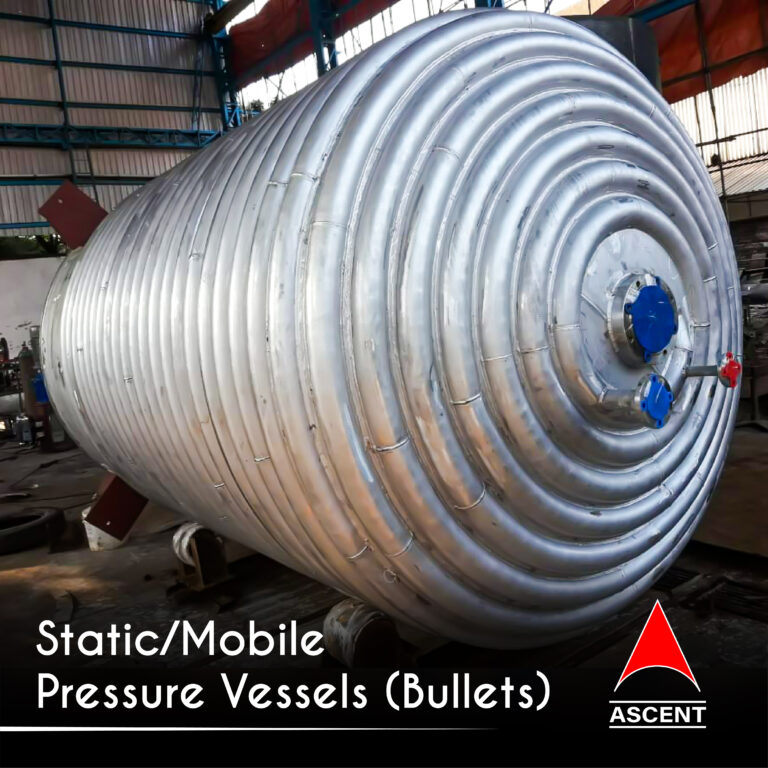
Home > Product Range > Industrial Process Equipment >Static Process Equipments > Static & Mobile Pressure Vessels (Bullets)
Tall Vertical Columns with/without Internals are specialized equipment designed for critical industrial applications such as distillation, absorption, stripping, and chemical separation. These columns play a vital role in ensuring process efficiency, optimizing heat and mass transfer, and maintaining operational reliability. Available with or without internals such as trays or packing, they can be customized to meet specific process requirements across diverse industries.
Ascent Machineries & Engineering Services Ltd., headquartered in Goregaon, Mumbai, India, is a renowned manufacturer, supplier, and exporter of premium-quality tall vertical columns. With a global footprint spanning over 80 countries, we deliver cutting-edge solutions adhering to international standards. Our commitment to innovation, durability, and customization ensures superior performance and cost-effectiveness for our clients.

Tall vertical columns are engineered to facilitate efficient separation and processing of fluids under varying operating conditions.
| Model | Capacity | Material | Price (₹) |
|---|---|---|---|
| Compact Column | Up to 10 meters | SS304 | 20,00,000 |
| Standard Column | Up to 25 meters | SS316 | 50,00,000 |
| Industrial Column | Up to 50 meters | Hastelloy | 1,20,00,000 |
Market Comparison:
What Are the Key Features of Tall Vertical Columns with/without Internals?
Designed for various industrial processes such as distillation and absorption.
Options for trays, packing, and distributors to enhance process efficiency.
High-grade materials ensure durability in aggressive environments.
Optimized designs reduce energy consumption.
Available in various sizes to meet specific capacity requirements.
Durable construction minimizes maintenance needs.
| Parameter | Details |
|---|---|
| Height | Up to 50 meters |
| Diameter | 500 mm to 5,000 mm |
| Operating Temp | -50°C to 400°C |
| Pressure Range | Vacuum to 50 bar |
| Material Options | SS304, SS316, Hastelloy, Alloy Steel |
| Internals | Structured Packing, Trays |
| Sealing Mechanism | PTFE, Viton Gaskets |
| Country of Origin | India |
Enhanced surface area for efficient mass transfer.
Suitable for high-capacity distillation processes.
Combines trays and packing for versatile applications.
Tailored to meet unique process requirements.
Cities: Mumbai, Delhi, Chennai, Bangalore, Dubai, Kuala Lumpur, and more.
Countries: India, UAE, Malaysia, South Africa, Kenya, UK, USA, Australia, and Vietnam.





They are widely used in chemicals, oil and gas, pharmaceuticals, and food and beverage industries.
Yes, we offer tailored solutions, including internals and material selection.
Delivery timelines range from 8 to 12 weeks, depending on specifications.
Optimize your industrial processes with Ascent Machineries & Engineering Services Ltd.‘s premium tall vertical columns. Contact us today for innovative solutions tailored to your needs.
ASCENT MACHINERIES & ENGG. SERVICES Shop No. 2, 1st Floor, Nalanda Shopping Center, Station Road, Goregaon West, Mumbai - 400062, Maharashtra, India
+919819063898
sales@ascentmes.com
© 2025 Ascentmes.com. All rights reserved. Designed by Vebiotic Web Solutions Marketing by Adinads